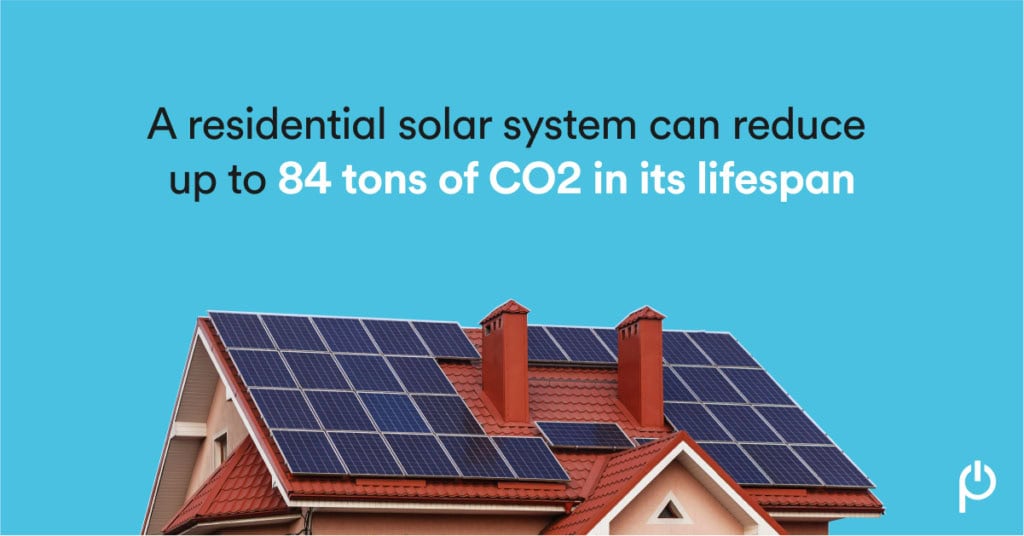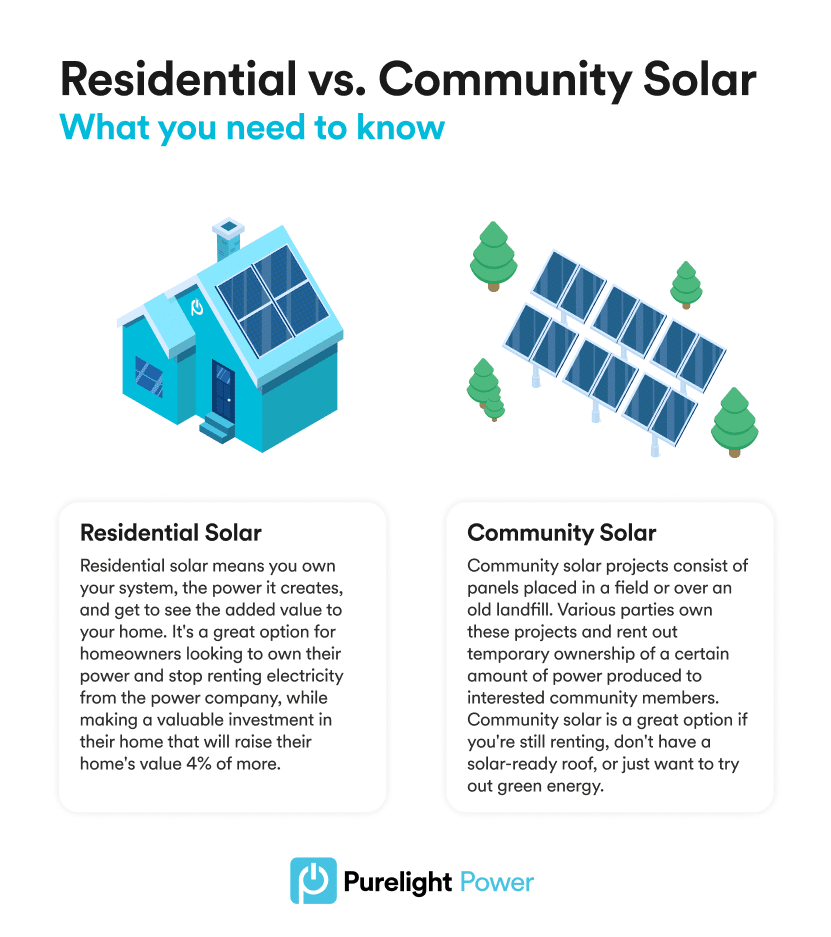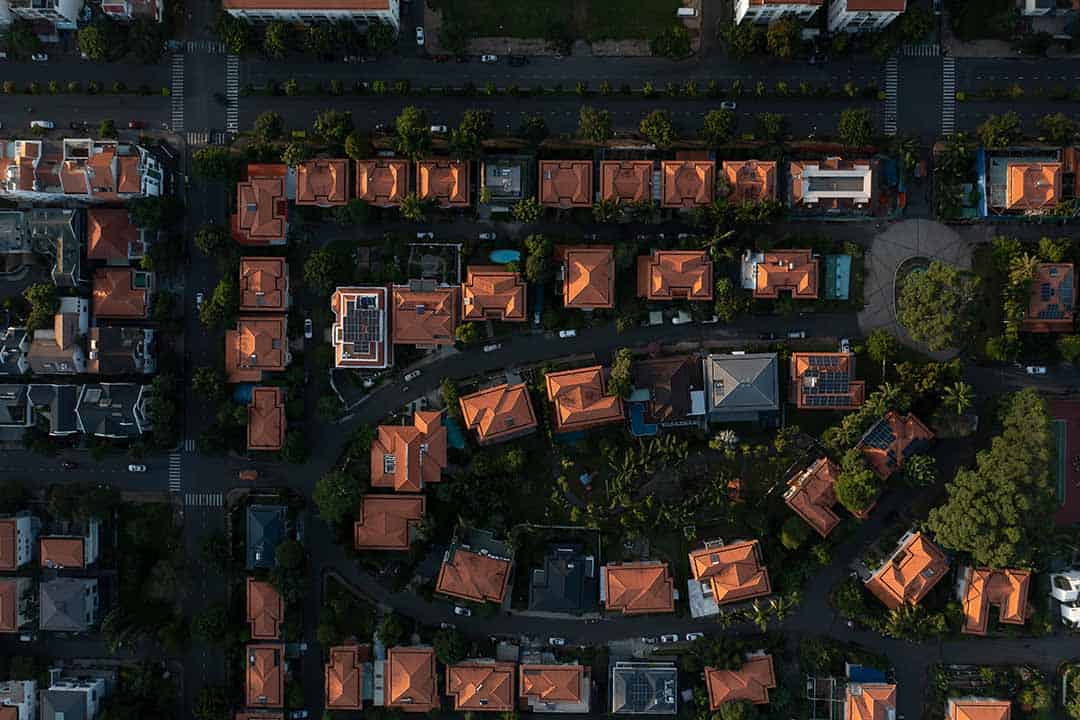What is community solar?
It’s a term many of us are seeing more frequently, possibly even on your power company’s website or your electric bill. How can homeowners know if the right choice for them is owning their own solar energy system, or temporarily investing in a community or utility owned solar project?
Keep reading as we cover what community solar is, how it’s similar and different from owning your rooftop solar system, and some of the pros and cons of community solar and home solar as options for cleaner electricity at home.
What is Community Solar?
Unlike a home solar system that not only adds value to your home but can help wipe out your power bill, community solar is sort of like a co-op.
A community solar project is set up somewhere in your state, and connected to the power grid. Then, shares of the project are sold to people who are effectively renting the power that the solar panels are producing.
So why would you want to rent those panels?
Well, if you rent or live in a home that can’t get solar installed directly, community solar is your next best option. Not buying the system and owning it outright, also means the cost to participate in a community solar program might be lower. Because you don’t own the system, that also means someone else is doing all the maintenance.
Why Would Homeowners Not Install Rooftop Solar?
With the number of shared solar projects growing (there are already projects in some areas of 26 states) it’s likely that you’ve seen some sort of advertising from a local power company or investor company about buying shares in a community solar project.
Community solar works similar to how net metering works with a home solar energy system, with your home still being connected to the grid. Your energy production is off-set with power produced by a solar farm, and depending on the rate the power company agrees to pay, you get a credit on your account.
Because the current policies surrounding tax incentives for solar owned by homeowners vary by state, and require certain qualifications for homeowners to make the most of them, we know that not everyone can get solar installed at home.
Renters, for instance, are regularly left out of the current efforts to make solar energy affordable for everyone in the US who wants an option for cleaner home electricity.
In these instances, community solar may be the only accessible option for someone who wants to go solar but doesn’t have a qualified roof to install on, or has their home tied to an electric grid served by a utility company that won’t work with net metering like in California.
Why Do People Choose Community Solar?
There are a few reasons why someone might not want to invest in community solar, and would instead choose owning their own rooftop solar power.
First and foremost? Often the returns on investing in solar you don’t own are much more limited.
Getting solar installed on your home can reduce your power bill by up to 94%, but the amount your subscription to a shared solar project reduces your bill will be variable. The amount of reduction is set by the policies of the company that owns the community solar project.
The amount you save by subscribing will vary, with the total savings being as low as 10% savings on your monthly power bill.
That doesn’t mean community solar isn’t worth it, or a bad project to invest in, it just isn’t quite as great of a return as having rooftop solar that increases your home’s value and can see all your energy coming from solar. Community solar is a key part of moving the US towards a clean, renewable energy future and meeting the 2035 carbon-free energy goals.

How To Choose: Home Solar or Community Solar?
Now that you’re more familiar with the ins and outs of community solar, you might be wondering how to figure out whether community or home solar is the right choice for you. There are a few factors to consider.
Do you rent or own your home?
Unless your landlord is extremely environmentally conscious, you won’t be able to have rooftop solar installed on a rental property. Instead, looking into whether your power company is partnering with any community solar projects and allows you to buy a subscription might be your only option for powering your home with solar energy.
If you own your home, and have a roof that qualifies, rooftop solar can be a great investment.
Do you plan to move soon?
If you do own your home but are expecting to move in the next year, investing in rooftop solar might not make sense for you. While rooftop solar does immediately raise the value of your home by upwards of 4%, if you’re just going to turn around and move you might choose to wait until you’re settled in your new home.
However, if you plan to stay in your home for the foreseeable future, rooftop solar pays for itself. Plus, today’s solar panels are rated to last at least 25 years, so they really can be a lifetime investment.
How much control over your investment in solar do you want?
For some people, the trade-off of having less control over the solar panels you’re paying for in exchange for not being responsible for any sort of maintenance is worth it.
But for homeowners who want to see the most return on their investment, and who want to make sure that they’ll continue seeing an investment every day you live in your home, rooftop solar is generally the better option.
Is your reason for going solar savings?
Community solar programs do save homeowners money, but just not as much as rooftop solar can.
Because a single community solar project is being used to serve upwards of hundreds of customers, and because the companies (utility companies and others) investing in the project need to make their money back, the amount you can save is less than when you make the investment in rooftop solar.
Make the Switch to Solar Today!
If you’re ready to stop renting your power and own your solar energy system, Purelight Power is here to help!
With our no pressure, free design consultation you can see exactly how much you’ll save every month.





